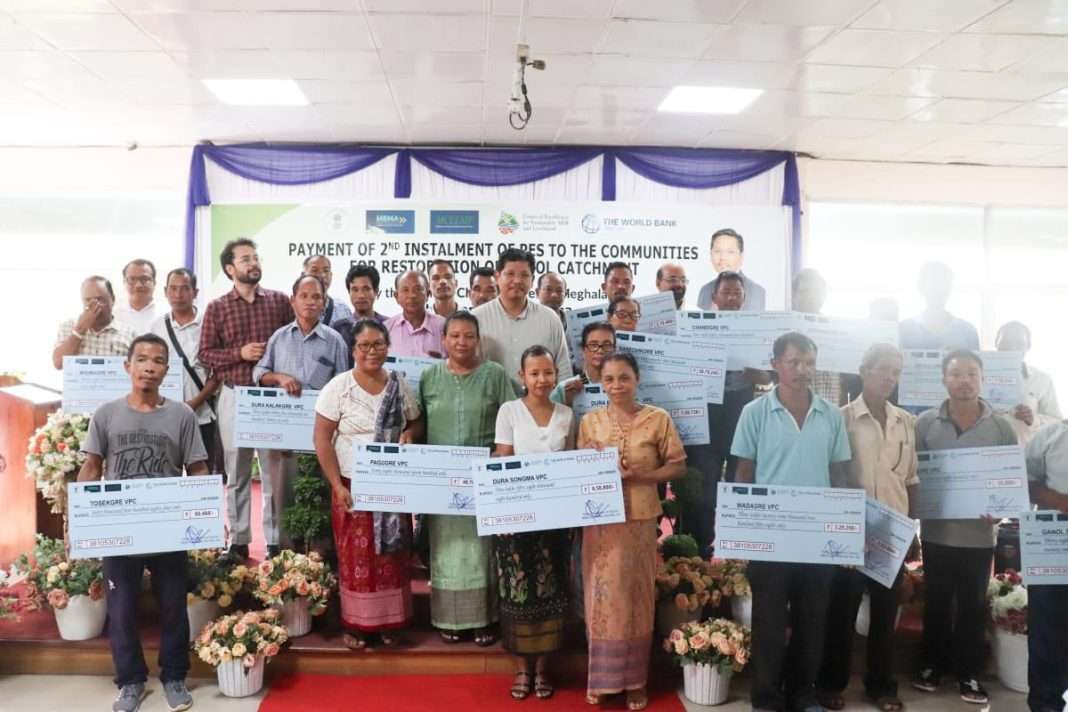Tura, Sep 1: Meghalaya Chief Minister on Friday presented the second installment of payments to the Village PES Committees (PES) under the PES Pilot Project for the Ganol Catchment at Dakopgre in Tura.
The second installment of the Payment for Ecosystem Services (PES) approach for restoration of Ganol Catchment, amounting to Rs 64.82 lakhs, was released and handed over to various community leaders.
Released the 2nd installment of the Payment for Ecosystem Services (PES) approach for restoration of Ganol Catchment amounting to ₹64.82 Lakhs to various community leaders.
PES aims to rehabilitate & protect the health of the catchment area & has encouraged 103 community… pic.twitter.com/vDnv1e5D61
— Conrad K Sangma (@SangmaConrad) September 1, 2023
The activities under this PES project include sustainable management of community forests, reforestation, afforestation, soil and water conservation, and transition from Jhum to improved agriculture.
Over 103 community members from 18 villages took part in the PES scheme. The total area covered under the PES scheme for ecological restoration is 7403.33 ha.
31 communities from 17 villages have opted for sustainable management of community forests covering a total area of 576.7 ha.
7 community members belonging to 4 villages have participated in the reforestation activity on 10.55 ha.
36 community members from 9 villages have carried out the afforestation on their land, covering 93.87 ha.
27 members took part in the soil and water conservation on 56.74 ha.
Meanwhile, two community members opted to undertake activities under Transition from Jhum to Improved Agriculture on 2.46 ha.
‘The Payment for Ecosystem Services (PES) Pilot Project for the Restoration of Ganol Catchment, worth Rs. 1.20 crore, was launched on April 2, 2022, in the state by Chief Minister Conrad K. Sangma.
Under the PES scheme, a financial support of Rs. 8,000 per hectare will be provided per year for five years. In addition, an additional reward amount of Rs. 5000 per hectare per year will also be given to those natural forests already registered as community reserves with the Forest Department. Rs 2000 per hectare per year will be given to those with very dense forests, those traditionally recognised as sacred groves, or has a living root bridge, or located in eco-sensitive zones around protected areas like national parks, wildlife sanctuary or wildlife corridors.
Also, those forests which are not yet registered, the applicant can apply for registration with the forest department and a copy of receipt may be submitted while applying for the PES scheme.
Also Read: What is ‘One Nation, One-Election’ ? Centre forms Ram Nath Kovind-headed committee-Explained
Also Watch
Find latest news from every corner of Northeast India at hubnetwork.in, your online source for breaking news, video coverage.
Also, Follow us on-
Twitter-twitter.com/nemediahub
Youtube channel- www.youtube.com/@NortheastMediaHub2020
Instagram- www.instagram.com/nemediahub





